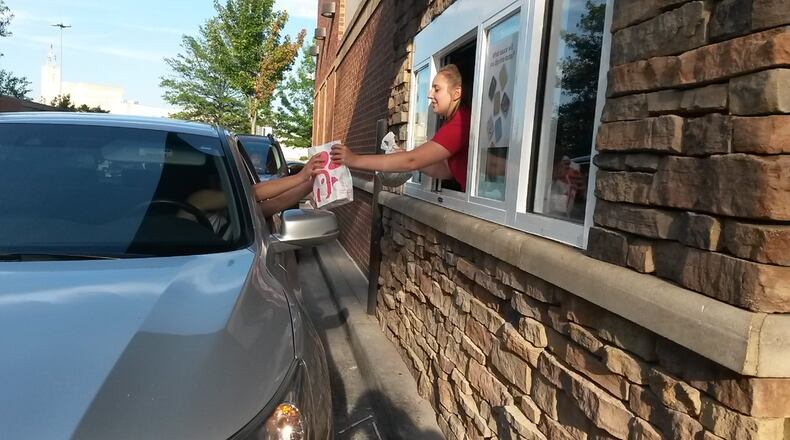Georgia’s jobless rate dropped last month below 6% — less than half the jobless rate of April and lower than the U.S. as a whole — as the state added 21,700 jobs, officials said Thursday.
In another sign the economy is rebounding from the depths of the coronavirus-triggered shutdown, Georgia last week processed 42,085 new jobless claims, the ninth consecutive weekly decline and the first time since March 21 that claims fell below 50,000.
But economists also warned that the jobs recovery is slowing, and that many of the jobs that have returned appear to be temporary and low paying.
Georgia’s official jobless rate, which counts only those looking for work, dropped to 5.7% in August from 7.6% in July.
The state’s jobless rate never rose as high as the national rate, and the rebound seemingly has outpaced that of the nation, which had 8.4% unemployment in August. Since April, Georgia has added more than 317,000 jobs, recouping 65% of those lost during the early spring.
The Georgia Department of Labor’s web site now lists more than 150,000 job openings, said Mark Butler, state labor commissioner. “We have seen many businesses re-engaging in the economy and bringing employees back to work.”
Yet not enough to soak up all the job seekers.
Even with the recent decline, new jobless claims are higher than the worst week of the Great Recession in 2009 and unemployment benefits are being paid to more than 643,000 Georgians.
Moreover, the pace of job gains has been slowing and the quality of those gains is suspect, said Rajeev Dhawan, director of the Economic Forecasting Center at Georgia State University.
Most new jobs in August were either temporary workers hired for the Census or lower-paid retail jobs at big chains, he said. “The biggest thing is the lack of high-paying jobs. The economy has not improved as much as the unemployment rate.”
Nationally, 860,000 new jobless claims were processed last week, also down slightly from the previous week.
Before the pandemic struck, Georgia’s jobless rate was a historically low 3.1%. Since then, the state labor department has processed nearly 3.7 million jobless claims, about one-third of them judged valid.
In the spring, many of the unemployed got help with rent and other expenses from an emergency $600-a-week payment from the federal government. After that ended in July, the Senate did not act on a bill to extend it, but an executive order by President Donald Trump shifted money from the Federal Emergency Management Agency to a temporary fund.
That money will pay most of Georgia’s unemployed up to $1,800. Payments for half of those benefits were issued this week to 564,613 people, according to the state labor department.
Data show a divide in Georgia’s economy, with many sectors improving while some suffer a Depression-level pain. Companies that provide in-person services like food, fashion or fitness have been especially hurt, but so are those that provided services to hotels, conference centers, restaurants and airlines.
That means some key sectors in Georgia’s economy will be crimped so long as consumers fear that travel, socializing, business meetings and large events are potentially dangerous to their health, Dhawan said.
“In July and August, air travel started to pick up but then the improvement stalled out,” he said. “The TSA says it’s still down 75%.”
Atlanta-area job openings in tech jumped 10% in the past four weeks — more than any other category — but that represents just a fraction of the labor market, according to data from Glassdoor.
Job openings in fitness and beauty dropped 14% in August. Openings in schools are down 3%, as are jobs in construction. Restaurant openings edged down 2%.
Statewide, small businesses, which account for about half of all employees, have seen a total drop of 19% in revenue since January, according to the most recent data from the Opportunity Tracker at Harvard University.
Overall business spending in Georgia edged up about 3% in early September from August, according to Cortera, a Florida-based tracker of corporate information. A year ago, spending was growing at a nearly 8% clip.
Nearly one-third of companies were late paying their bills, compared with 28% a year ago, Cortera said.
Consumer spending in the state is 5% below January levels. Food spending is up a solid 8%, but spending at restaurants is down 24%, according to the Harvard researchers.
Georgia job growth or loss
January: 11,200
February: 800
March: -33,500
April: -498,100
May: 99,600
June: 151,300
July: 43,800
August: 21,700
Sources: Georgia Department of Labor, Bureau of Labor Statistics
_______________
New jobless claims filed in Georgia
Week ending
July 4: 105,160
July 11: 138,452
July 18: 122,313
July 25: 84,984
Aug. 1: 73,931
Aug. 8: 62,335
Aug. 15: 58,099
Aug. 22: 56,768
Aug. 29: 51,283
Sept. 5: 50,320
Sept. 12: 42,085
Sources: Georgia Department of Labor, Employment and Training Administration
_____________
Georgia unemployment rate (share of workforce looking for a job)
January: 3.1%
February: 3.1%
March: 4.6%
April: 12.6%
May: 9.4%
June: 7.6%
July: 7.6%
August: 5.7%
Sources: Georgia Department of Labor, Bureau of Labor Statistics
_____________
About the Author
Keep Reading
The Latest
Featured



